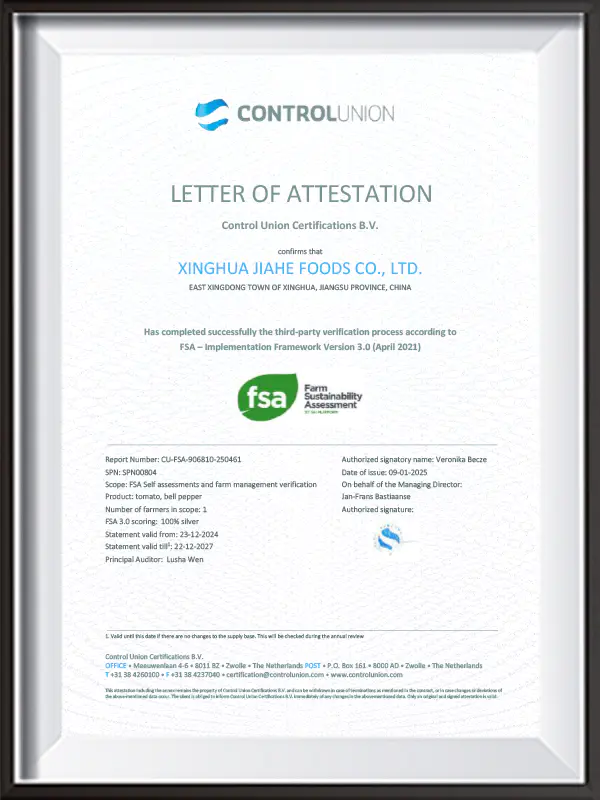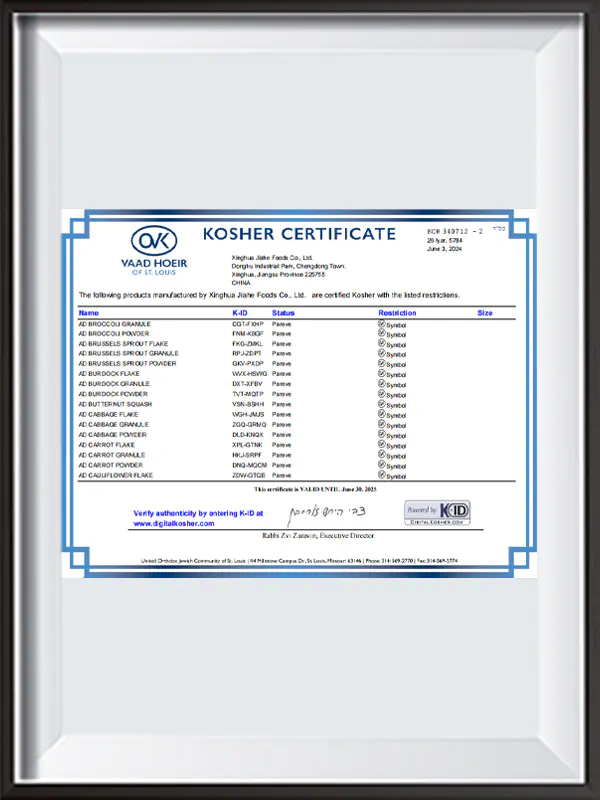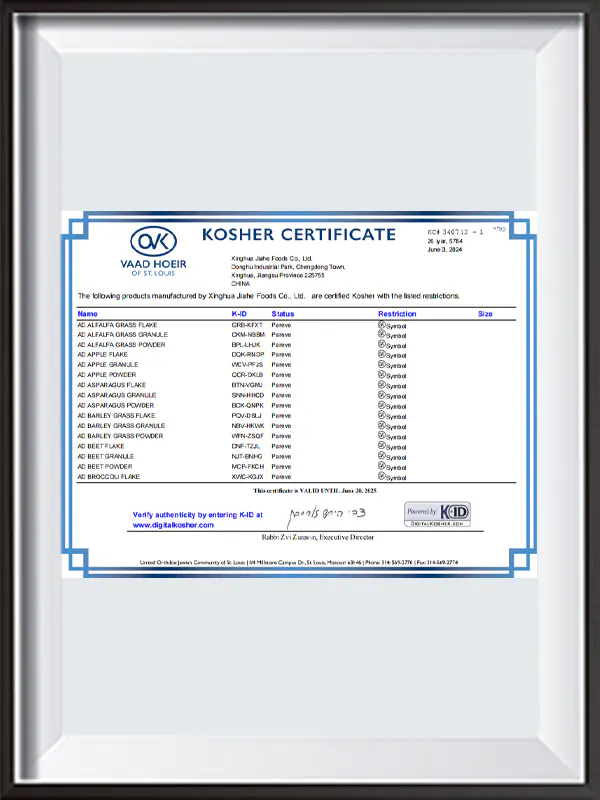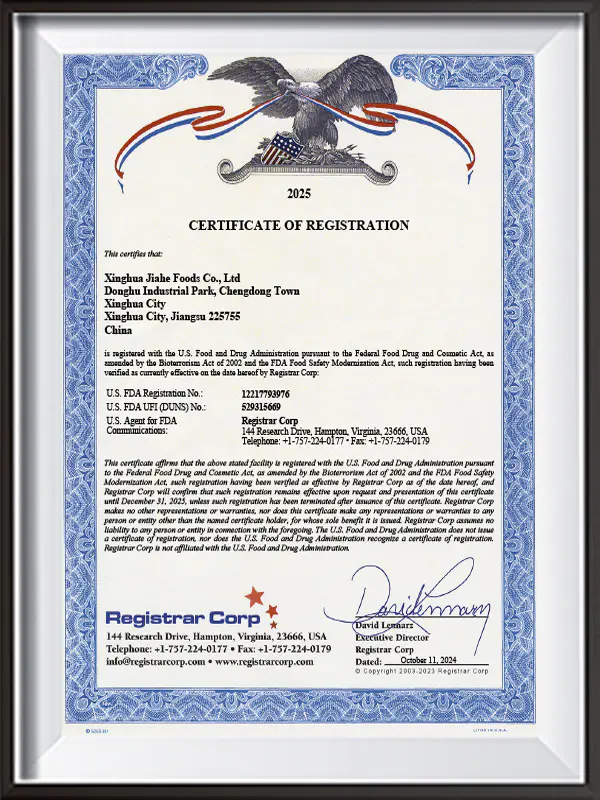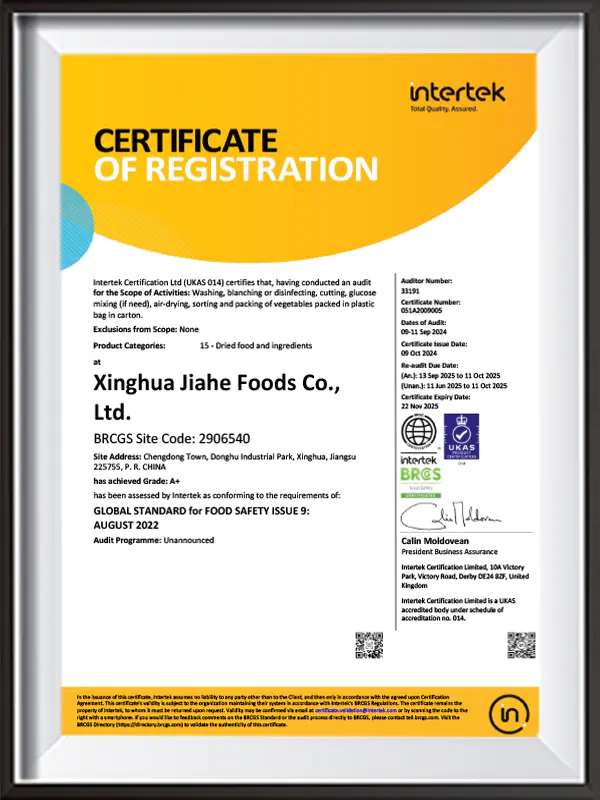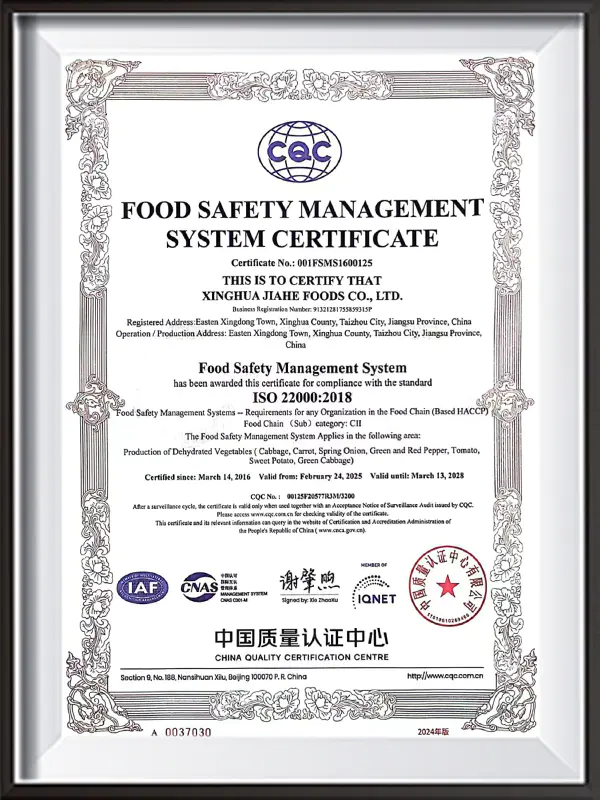Xinghua Jiahe Foods Co., Ltd is China Dehydrated Bok Choy Manufacturers and Dried Chinese Cabbage Factory, located in Xinghua city Jiangsu province, established in 2003. We are an experienced manufacturer and distributor of air dried vegetables and fruits in China. After more than 10 years fast development, now we are proud of being one of the top 3 manufacturers in China. We have built ourselves as a whole-range of consistent, affordable, and safe food products to the ingredient market. Our plant takes up an area of 25`000㎡with an annual capacity 8000 tons. We also have more than 300 hand-sorting workers, this is the last critical control point. Some defect materials which are out control of the facilities will be removed clearly. We have a multiple supply range. As Dehydrated Chinese Cabbage Exporter & Importer, we can supply you not only flake, dice, granules -- but also powder according to your need. All finish products are made from selected, fresh materials.
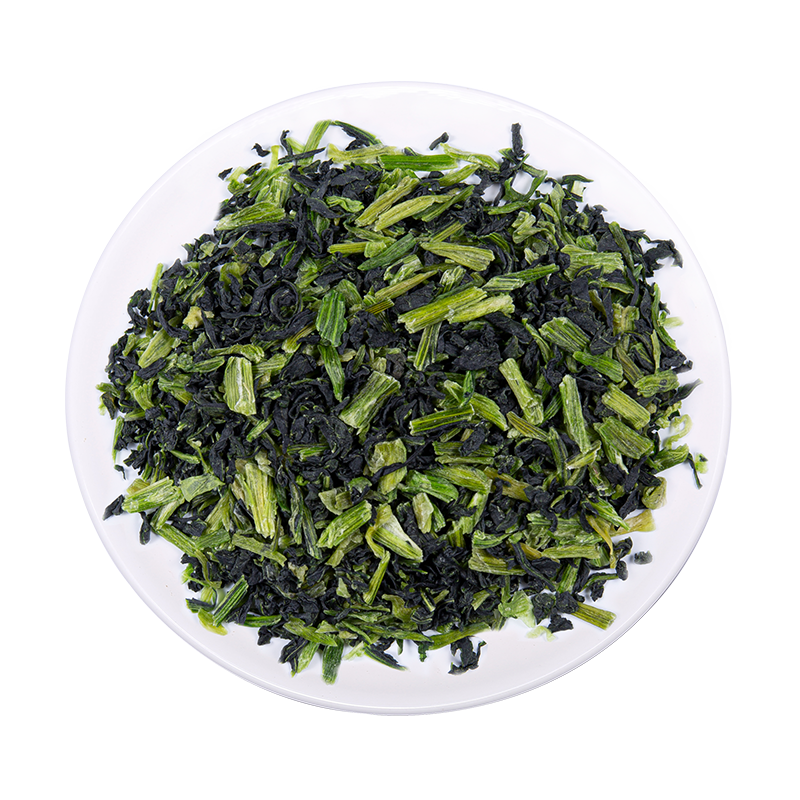
Dehydrated Chinese Cabbage
Field-fresh bok choy is sorted, washed, trimmed, blanched, and air-dried. The processing sequence initiates with rigorous cleaning protocols, material segregation, and HACCP compliance measures before proceeding to particle size modification via blade cutting or abrasive milling techniques
- 10X10MM
- 15X15MM
- 20X20MM
Dried bok choy is used in making seasonings, soup stocks, ready-to-eat foods (such as instant noodles) and snacks (such as low-calorie crisps). In the catering field, it is often used in cold dishes, salads, stews or wraps. At home, it can be used as a convenient ingredient and can be directly used for stir-frying, making fillings or mixing in dishes after being rehydrated.
Authentic reliable quality naturally stands out and fears no comparison.
Provide you with the latest enterprise and industry news.
-
How resistant is the Dehydrated Green Pepper to microbial growth, mold, or spoilage during storage and transport?
Low Moisture Content: One of the most critical factors contributing to the microbial stability of Dehydrated Green Pepper is its extremely low moisture content achieved during the dehydration process. Water is a fundamental requirement for the growth of bacteria, yeast, and mol...
-
How should Dehydrated Tomato be stored to maintain its shelf life, color, and flavor over time?
Temperature Control Maintaining the proper storage temperature is critical for preserving the quality of Dehydrated Tomato over time. Ideally, it should be stored in a cool, dry environment between 10–25°C (50–77°F). Elevated temperatures accelerate chemical reactions such as Mai...
-
How does the particle size, cut type (shredded, sliced, diced), or granulation of Dehydrated Cabbage affect rehydration performance and application in food processing?
Particle Size and Surface Area:The particle size of Dehydrated Cabbage has a profound effect on its water absorption rate, rehydration kinetics, and suitability for different culinary applications. Smaller particles or finely shredded cabbage present a higher surface-area-to-vo...
Raw materials and processing technology of dehydrated Chinese cabbage
Dehydrated Chinese cabbage uses fresh and high-quality Chinese cabbage as raw material. After picking, it needs to go through the following series of refined processing processes:
Sorting and cleaning: Before the raw materials enter the production line, they are first sorted manually or mechanically to remove pests or rotten parts to ensure the overall freshness and safety of the raw materials. Then, through a multi-stage cleaning process, mud and impurities are removed to provide a clean foundation for subsequent processing.
Trimming and cutting: According to the requirements of the final product shape, the outer old leaves of the cabbage are removed and trimmed according to specifications to ensure uniform cutting.
Blanching and enzyme killing: Blanching with high-temperature water or steam for a short time can kill surface microorganisms on the one hand, and on the other hand, passivate the oxidase activity in the cabbage, prevent discoloration and loss of nutrients, and lay the foundation for maintaining the color and taste of the product.
Dehydration and drying: Most of the water in the cabbage is removed by hot air circulation dehydration or low-temperature airflow drying, generally controlled below 5%, thereby significantly extending the shelf life and facilitating storage and transportation.
Particle size adjustment and packaging: The dehydrated Chinese cabbage is further cut into slices, shreds, grains or powders of different specifications according to customer needs, and weighed and packaged. The final product has no additives or preservatives, and retains the original color, aroma and taste of the cabbage.
During the entire processing process, the HACCP food safety management system is strictly followed to ensure that each process meets international standards. This series of processes not only maintains the original flavor and nutrition of the cabbage, but also gives it a wider range of applicability.
Functional advantages of dehydrated Chinese cabbage
1. Retaining nutrients:
Although the dehydrated Chinese cabbage has been dried at high temperature, it still retains its original nutrients well under the optimization of modern temperature control technology and time management:
Vitamin C: Although it is a heat-sensitive nutrient, its antioxidant function can be retained without destroying the active ingredients through low-temperature hot air or vacuum drying technology.
Potassium: Potassium is a key mineral for regulating the body's water and electrolyte balance, which helps control blood pressure and maintain normal nerve and muscle function.
Dietary fiber: The soluble and insoluble fibers in Chinese cabbage maintain a good structure during the dehydration process, which is beneficial to the stability of intestinal peristalsis and intestinal flora ecology.
Low-calorie characteristics: The calories contained in every 100g of dehydrated Chinese cabbage are extremely low, which is suitable as a supplementary material for healthy diet plans such as light meals and low-carbon diets.
These retained ingredients not only guarantee the "food function" of dehydrated products, but also strengthen their "nutrition label", becoming an important carrier of the concept of "combining diet therapy".
2. Easy to store and transport:
The dehydration process significantly changes the physical properties of the original vegetables. The biggest advantage is the significant reduction in volume and weight, which brings the following practical benefits:
Weight reduction of more than 80%: The dehydrated cabbage only retains about 5%-8% of water, which greatly reduces the overall weight and reduces transportation and storage costs.
Strong room temperature storage ability: No cold chain support is required, and the shelf life can be achieved in a dry state for 6 to 24 months, which greatly facilitates long-distance transportation and overseas exports.
High packaging flexibility: The dehydrated form can adapt to a variety of packaging forms (small packaging, vacuum packaging, bulk, etc.), meeting the needs of different channels such as catering, supermarkets, and families.
3. Excellent rehydration performance:
Another major technical advantage of dehydrated Chinese cabbage is its good rehydration and restoration performance:
Fast recovery speed: Soak in hot water at about 80℃ for 5~10 minutes, and the original soft texture can be quickly restored;
The taste is close to fresh: After rehydration, the cabbage leaves can still maintain toughness and juiciness, and are not easy to become mushy. The taste after cooking is similar to fresh cabbage;
Natural color and visually attractive: The cabbage leaves dried by hot air are clear in color and do not fade. After recovery, the appearance is beautiful, which improves the overall sensory quality of the dish;
Fast nutrient release: The fiber tissue is loose, which is easy for the human body to absorb nutrients, especially suitable for infant food or elderly nutritional diet design.
4. Clean label attributes:
No preservatives, no added pigments: Under the physical dehydration process, the water activity of cabbage itself is greatly reduced, and no chemical preservation is required;
No flavors and spices: retain the fragrance and freshness of the original vegetables, no additional seasoning is required, suitable for infants, mothers and babies or health functional foods;
Clear ingredient label: only "cabbage" is listed on the packaging label, without any "E" number or artificial substances, in line with the "label transparency" requirements of the European and American markets;
Traceable raw material sources: Xinghua Jiahe has established a raw material planting base and origin traceability mechanism to provide food safety guarantees for food brands.
Wide range of product application scenarios
Dehydrated Chinese cabbage has a wide range of applications in many fields due to its diverse processing forms, convenient storage and nutrient retention:
Seasoning and soup base raw materials: commonly used in soup bases, hot pot seasoning bags, soup powder, seasoning sauces and other formulas to add natural vegetable flavor and taste levels to the product.
Convenient food field: widely used in instant noodle vegetable packs, self-heating rice, instant rice noodles, self-heating hot pot and other convenient foods to improve the nutritional balance of products.
Low-calorie snack development: dehydrated cabbage slices can be processed into baked low-calorie healthy crisps to provide new snack options for consumers who pursue health.
Auxiliary ingredients in the catering industry: in chain restaurants and central kitchens, it can be used for cooking, cold salad, stewing or stuffing, saving labor costs and improving food delivery efficiency.
Home kitchen use: as a long-term reserve "dry vegetable pack", it can be rehydrated at home at any time, suitable for daily cooking such as stewing soup, cooking, and making dumpling stuffing.
Enterprise strength guarantees product quality-Xinghua Jiahe Foods Co., Ltd.
Since its establishment in 2003, Xinghua Jiahe Foods Co., Ltd. has focused on the research and development, processing and export of dehydrated fruits and vegetables.
Production scale and facilities: The company has the full process industrial capabilities from raw material acceptance to cutting, drying, grading and packaging.
Quality management system: strictly implement HACCP, ISO and other quality control standards, and have a complete raw material traceability and product testing system.
Artificial screening to ensure quality: more than 300 manual sorting workers are employed to perform manual inspections in the final stage where automated equipment cannot completely screen out impurities, ensuring the purity and consistency of the products shipped out of the factory.
Multi-form product supply: Dehydrated Chinese cabbage products in the form of flakes, granules, filaments and powder can be provided according to different customer needs to meet diversified processing and application needs.
Raw materials are controllable and directly supplied from the place of origin: local high-quality cabbage planting bases are selected to ensure that the source of raw materials is green, traceable and pollution-free.


 English
English Français
Français Español
Español
